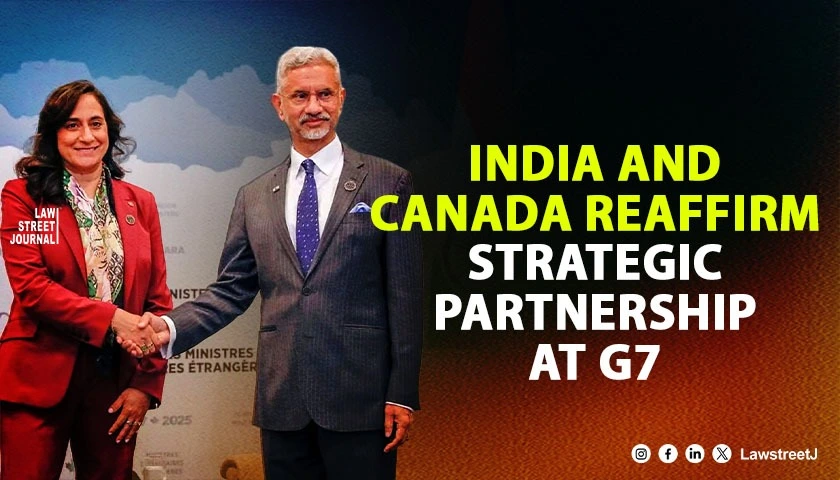New Delhi: External Affairs Minister S. Jaishankar and Canadian Foreign Minister Anita Anand met on the sidelines of the G7 Foreign Ministers’ Meeting in Niagara, Ontario, reaffirming their commitment to reset and rebuild the India–Canada partnership. The discussion centered on carrying forward the New Roadmap 2025 and strengthening cooperation in trade, clean energy, critical minerals, and security. This was the third meeting between the two ministers in 2025, highlighting a steady return of diplomatic warmth between New Delhi and Ottawa. The dialogue, held as part of India’s participation in the G7 as an outreach partner, represented a step toward restoring trust after a turbulent period in bilateral relations.
Official statements from Global Affairs Canada and India’s Ministry of External Affairs (MEA) confirmed that the talks reviewed progress under the New Roadmap 2025, a joint framework introduced earlier this year to expand cooperation in energy, trade, and law enforcement. During the meeting, Minister Anand extended condolences to the victims of a recent explosion in New Delhi and expressed Canada’s solidarity. Jaishankar appreciated Canada’s role as host of the G7 Foreign Ministers’ Meeting and emphasized the importance of rebuilding ties through dialogue grounded in respect and shared priorities.
Understanding the New Roadmap 2025
The New Roadmap 2025, first presented during Minister Anand’s visit to New Delhi in October, serves as a forward-looking plan for cooperation. Although it is legally non-binding, it outlines a detailed mechanism to guide collaboration across sectors already governed by existing agreements and international frameworks.
Several legal and policy instruments underpin the roadmap:
- Foreign Investment Promotion and Protection Agreement (FIPA): Aims to encourage two-way investments and provide clear procedures for dispute resolution.
- MoU on Critical Minerals Cooperation (2023): Focuses on joint exploration, processing, and integrating supply chains for rare earth elements and lithium.
- Framework Agreement on Energy Collaboration: Promotes cooperation in renewable energy, hydrogen projects, and power grid modernization.
The two sides also agreed to maintain close dialogue on law enforcement, particularly in counter-terrorism, cybercrime, and extradition matters. The Royal Canadian Mounted Police (RCMP) and India’s Central Bureau of Investigation (CBI) will continue agency-level coordination to support these goals.
Trade remains a key element in the partnership. In 2024, bilateral trade reached CAD 12.3 billion, with India exporting pharmaceuticals, textiles, and IT services, while Canada supplied pulses, fertilizers, and energy products. The roadmap proposes measures to ease customs procedures, cut non-tariff barriers, and reopen talks on a Comprehensive Economic Partnership Agreement (CEPA).
Geopolitical Backdrop and Diplomatic Realignment
The meeting comes amid shifting geopolitical alignments and a deliberate attempt to move beyond tensions that followed the 2023 allegations raised by Canadian authorities regarding foreign interference. Since then, both sides have prioritized the restoration of normal diplomatic engagement. The G7 platform served as a neutral and constructive setting for this renewed conversation. India’s presence as an outreach partner reflects its growing role in shaping global policy, especially as a voice for the Global South. The MEA said that India’s approach at the G7 remains rooted in multilateral cooperation, sustainable development, and inclusive global governance.
Both ministers acknowledged that a stable and transparent partnership is essential not only for trade and technology but also for ensuring resilient supply chains in critical sectors such as clean energy and digital infrastructure. Another focus of the meeting was the strong community and educational ties between the two nations. Canada currently hosts more than 800,000 people of Indian origin, forming one of the world’s largest Indian diaspora communities.
Discussions included enhancing academic exchanges, smoother immigration procedures, and cultural partnerships. The New Roadmap 2025 contains specific measures to promote student mobility and mutual recognition of educational qualifications, helping institutions from both countries collaborate in research and innovation. Both ministers stressed that these human connections remain at the heart of the bilateral relationship.
Both countries will now establish working groups to track implementation of the roadmap. The next review meeting is planned for early 2026, focusing on progress in trade facilitation, legal harmonization, and strategic resource alignment. Officials noted that upcoming sessions would also monitor developments in critical mineral cooperation and renewable energy ventures. The MEA underlined that steady dialogue and consistent follow-up would be essential to translate policy into tangible outcomes.
Diplomatic observers view the Jaishankar–Anand engagement as a clear signal of forward movement in India–Canada relations. The meeting underscored a renewed willingness on both sides to turn the page and rebuild cooperation on the foundations of shared values, complementary economies, and mutual benefit.








